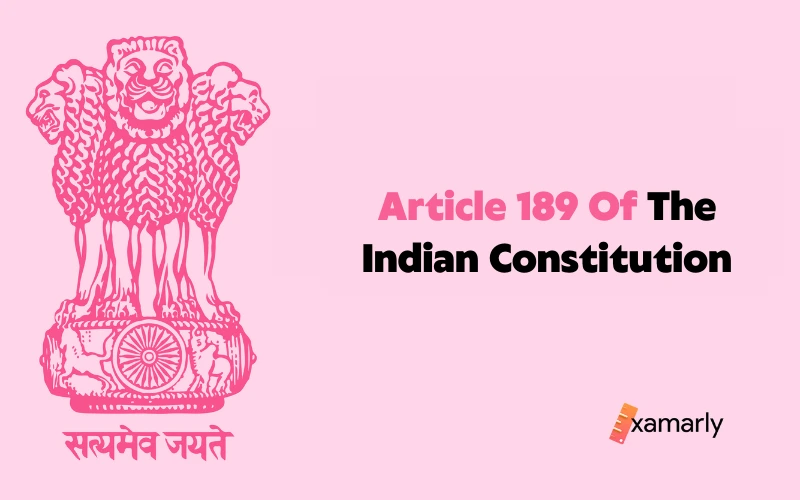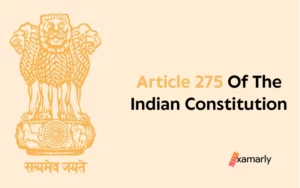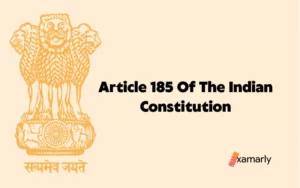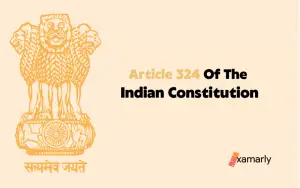Article 189 of the Indian Constitution deals with the constitutional provisions related to the voting in the Houses of the State Legislature and the power to act that is bestowed upon these Houses regardless of vacancies and quorum. In this manner, it takes into account the conduct of business in the State Legislative body.
This is an important article that needs to be thoroughly understood by UPSC aspirants. Read along to familiarise yourself with the contents of Article 189, the clauses it is constituted of, their explanation and the key amendments of the Indian Constitution associated with this article.
- Article 189 Of The Indian Constitution – An Introduction
- Analysing The Clauses Of Article 189 Of The Indian Constitution
- Clause (1) Of Article 189 Of the Indian Constitution: Explained
- Clause (2) Of Article 189 Of the Indian Constitution: Explained
- Clause (3) Of Article 189 Of the Indian Constitution: Explained
- Clause (4) Of Article 189 Of the Indian Constitution: Explained
- The Amendment It Is Related To
- Summing Up
- FAQs
- Which Other Article Is Related To The Conduct Of Business?
- How Many Clauses Are There In Article 189 Of The Indian Constitution?
- What Do You Understand By A Quorum?
- What Is The Other Name For The State Legislative Council?
- The State Legislative Assembly Is Also Known By The Name Of?
- Which Two Clauses Of Article 189 Of The Indian Constitution Talk About A Quorum?
- Which Two Clauses Were Omitted From Article 189 Of The Indian Constitution?
- Which Article Of The Indian Constitution Does Article 189 Correspond To?
- How Does The Judiciary Look At Clause (4) Of Article 189 Of The Indian Constitution?
Article 189 Of The Indian Constitution – An Introduction
In the official document of the Constitution of India, Article 189 has been stated as the following:
“189. Voting in Houses, power of Houses to act notwithstanding vacancies and quorum.—
(1) Save as otherwise provided in this Constitution, all questions at any sitting of a House of the Legislature of a State shall be determined by a majority of votes of the members present and voting, other than the Speaker or Chairman, or person acting as such. The Speaker or Chairman, or person acting as such, shall not vote in the first instance, but shall have and exercise a casting vote in the case of an equality of votes.
(2) A House of the Legislature of a State shall have power to act notwithstanding any vacancy in the membership thereof, and any proceedings in the Legislature of a State shall be valid notwithstanding that it is discovered subsequently that some person who was not entitled so to do sat or voted or otherwise took part in the proceedings.
(3) Until the Legislature of the State by law otherwise provides, the quorum to constitute a meeting of a House of the Legislature of a State shall be ten members or one-tenth of the total number of members of the House, whichever is greater.
(4) If at any time during a meeting of the Legislative Assembly or the Legislative Council of a State there is no quorum, it shall be the duty of the Speaker or Chairman, or person acting as such, either to adjourn the House or to suspend the meeting until there is a quorum.”
Analysing The Clauses Of Article 189 Of The Indian Constitution
Article 189 of the Indian Constitution constitutes of four clauses. We will look at them individually and start to analyse the provision it provides. These provisions put forth the special procedure in respect of the meetings and votings within the Houses of the Legislature of a State.
Given below is a detailed explanation of the clauses of Article 189 of the Indian Constitution. Let us take them up one by one.
Clause (1) Of Article 189 Of the Indian Constitution: Explained
The first clause of the article states that except for specifically mentioned in the Constitution, for every sitting that needs to be held in either of the Houses of the Legislature of a State, be it the State Legislative Council (Vidhan Parishad) or the State Legislative Assembly (Vidhan Sabha), the fate of the question being discussed in the sitting will be decided based on the majority of the votes received either in favour of it or against it.
The Chairman, in case of the State Legislative Council and the Speaker, in case of the State Legislative Assembly, or any individual substituted on their behalf to perform their role in their absence shall not participate in the voting for all questions at any proceeding of the House of the Legislature of a State.
The clause further explains that the Chairman or the Speaker or any person filling in for their role in their absence shall not have the power to vote in the first round of voting. However, if a situation arises where there is an equality of votes, then the above-mentioned authorities shall be given the right to cast their vote to reach to a clear distinction of majority votes.
Clause (2) Of Article 189 Of the Indian Constitution: Explained
The second clause of this article throws light on the fate of the proceedings of the Houses of the Legislature of a State in case of vacancies and in cases where casting of vote by any member occurs when they are not qualified to do so.
The clause suggests that either of the Houses of the Legislature of a State, be it the State Legislative Council or the State Legislative Assembly has the authority to act on its will in the case of any membership of the House remaining vacant due to any reason. In addition to that, the voting in any of the House of the Legislature of a State remains valid even after it is found that any member was not qualified to do so had cast their vote, or sat or became a part of the proceeding.
The vote of the unqualified members is counted out of the entirety of votes and the clear majority is still concluded as the result for such a voting.
Clause (3) Of Article 189 Of the Indian Constitution: Explained
As per the third clause of Article 189, we get to know that a quorum is a crucial part of the House of the Legislature of a State. The State Legislative Council or the State Legislative Assembly needs a quorum for holding its meetings which help in its smooth functioning.
This clause specifies the number of members that must be present during any meeting of Vidhan Parishad or the Vidhan Sabha. It further says that, the greater number is to be considered for the composition of the quorum of either of the Houses of the Legislature of a State between ten or one-tenth of the members that are a part of the House. This clause is applicable until the Legislature of the State makes changes to it as per the law.
Let us try to grasp this in the form of a simplified procedure with the help of two examples. For instance, consider that there are one-fifty members in the House of the Legislature of a State, then the quorum is to be chosen between ten members and fifteen members (one-tenth of the total number of members). Since, fifteen is the greater number the quorum will be made up of fifteen members.
This concept will become even more clear with the help of a second example. In this case, let us take the number of members in the House of the Legislature of a State to be ninety. One-tenth of this membership is nine. The quorum is to be decided between ten or nine members, whichever is greater. Since, ten is the bigger number, hence, the quorum in this case will be made up of ten members instead of nine.
Clause (4) Of Article 189 Of the Indian Constitution: Explained
The final clause of Article 189 tells us the course of action in case the quorum is not present at any meeting of the House of the Legislature of a State due to any reason. Any proceeding cannot be carried out without the presence of a quorum.
The Chairman in the State Legislative Council and the Speaker in the State Legislative Assembly or any individual fulfilling their roles and responsibilities as their substitute in their absence, is to be bestowed upon the authority in the form of a duty to either dismiss the House or to postpone the meeting to a further date, until a quorum is present at any such meeting.
The Amendment It Is Related To
Clause (3) and clause (4) of Article 189 of the Indian Constitution were left out of the Constitution by the Constitution (Forty-second Amendment) Act, 1976. It was possible because of Section 31 of that amendment.
However, Section 45 of the Constitution nulled Section 31. This was brought into effect by the Constitution (Forty-fourth Amendment) Act, 1978. This helped to restore clause (3) and clause (4) back into Article 189 of the Indian Constitution.
Summing Up
Now that we are familiarised with Article 189 of the Indian Constitution, in a nutshell, we can conclude that through the provisions mentioned in its four clauses, this article aims to regulate the voting in either of the Houses of the Legislature of a State. Despite the vacancies and the quorum, it also accords on them the power to act in a defined way. These ways are specified in the four clauses that constitute the article.
FAQs
Which Other Article Is Related To The Conduct Of Business?
Article 188 of the Indian Constitution also talks about Conduct of Business.
How Many Clauses Are There In Article 189 Of The Indian Constitution?
Article 189 is divided into four clauses, namely- clause (1), clause (2), clause (3), and clause (4).
What Do You Understand By A Quorum?
A quorum is the total number of members whose presence is crucial for the holding of a meeting in either of the Houses.
With regard to the Houses of the Legislature of a State, a quorum is composed either of ten members or of one-tenth of the total members, whichever out of these is the greater number.
What Is The Other Name For The State Legislative Council?
The other name for the State Legislative Council is the Vidhan Parishad.
The State Legislative Assembly Is Also Known By The Name Of?
The State Legislative Assembly is also known as the Vidhan Sabha.
Which Two Clauses Of Article 189 Of The Indian Constitution Talk About A Quorum?
Clause (3) and clause (4) of Article 189 talks about a quorum.
Which Two Clauses Were Omitted From Article 189 Of The Indian Constitution?
Clause (3) and clause (4) were omitted from Article 189 of the Indian Constitution. These two clauses were omitted by the Constitution (Forty-second Amendment) Act, 1976.
However, it is to be noted here that the above-mentioned amendment was itself nulled due to the Constitution (Forty-fourth Amendment) Act, 1978 and the two clauses were restored.
Which Article Of The Indian Constitution Does Article 189 Correspond To?
Article 189 corresponds to Article 100 of the Indian Constitution. The provisions contained in both the articles are quite similar in nature as Article 100 is concerned with the voting in the Houses of the Parliament and the power accorded to these Houses despite the vacancies and the quorum.
How Does The Judiciary Look At Clause (4) Of Article 189 Of The Indian Constitution?
The Judiciary is of the view that an ordinance or a piece of law approved by the Legislature cannot repeal Article 189(4) of the Indian Constitution. This specific clause of the article made quorum an indispensable requirement as per the principles of the Constitution. The Judicial body believed that an ordinance cannot state that a quorum is not required.






